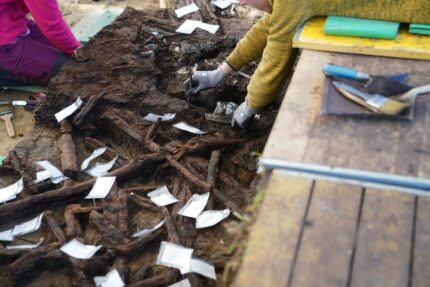Archaeologists have discovered a 10,500-year old cremation grave in Lüchow, Schleswig-Holstein, that contains the oldest known human remains ever found in northern Germany. The remains were discovered in the Duvensee bog, a prehistoric inland lake which contains more than 20 Mesolithic and Neolithic archaeological sites. The anaerobic environment of the bog preserves organic remains, even bones that have been burned, but there was so little left that it wasn’t until the team unearthed a human thigh bone that they were able to confirm they had found a burial.
Burials of the hunter-gatherer-fisher people who inhabited Europe in the early Mesolithic era are extremely rare. Mesolithic burials have been found before in the north of Germany and southern Scandinavia, but only from the Late Mesolithic (7th-6th millennia B.C.). The only burial comparable in time frame was found in Jutland, Denmark. It too is a cremation burial, which is an indication that cremation may have been the predominant burial practice among the Mesolithic hunter-gatherers.
The excavation revealed the presence of several bone pieces that were not completely charred. Excavation director Harald Lübke hopes they may be able to retrieve archaeological DNA from them. The entire grave was raised in a soil block for further excavation and study in laboratory conditions.
The oldest known North German raises a lot of questions. For example, according to the circumstances of death. In the case of burned bones, it is difficult to determine the cause of death, says Lübke. The entire Duvenseer Moor is a hotspot for archaeologists. “We’ve only opened a new door here at the moment. But behind it there are only dark rooms at the moment.” Due to their spectacular cremation find, they will probably continue digging there in the coming year.
